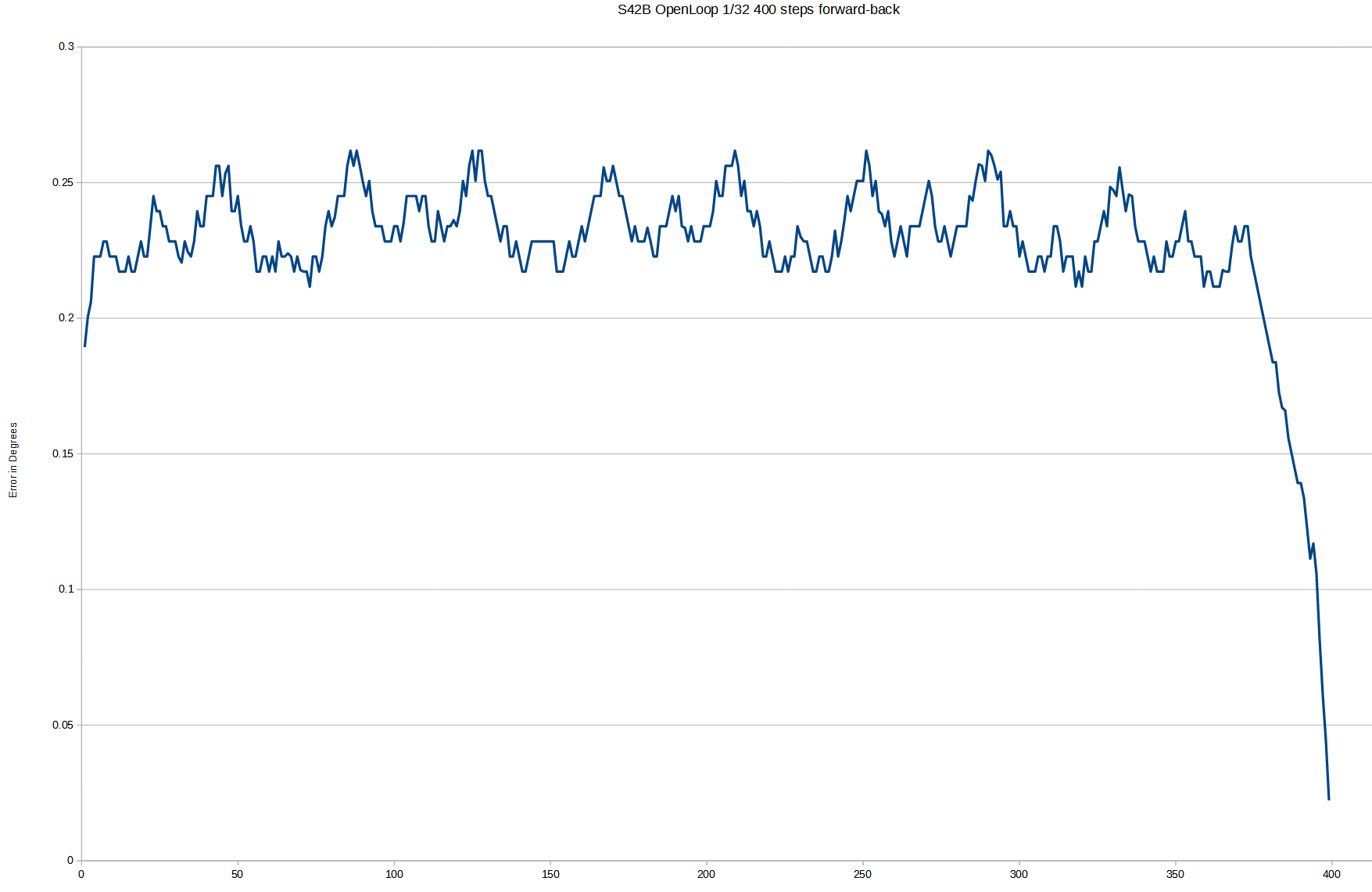stepper precision
-
@mendenmh I don't plan to learn python and it's libraries today (I hope never), dunno why it was invented and how the hack it gained popularity but... I'll make it work somehow to get this done.... anyone want to send some code for me to run I'll be happy to
 .. my example that's attached is enough for anyone to know how to read the data from encoder and move the motor, so I'll run the code provided and report back results
.. my example that's attached is enough for anyone to know how to read the data from encoder and move the motor, so I'll run the code provided and report back results  if anyone is interested ...
if anyone is interested ...attm waiting for this to finish:
#!/usr/bin/env python3 import pyprofibus import time import RPi.GPIO as GPIO def main(watchdog=None): master = None forwarddata = [] backwardsdata = [] #poserem se na jezik for i in range(410): forwarddata.append(0); backwardsdata.append(0); try: config = pyprofibus.PbConf.fromFile("arhi_readencoder.conf") master = config.makeDPM() outData = {} for slaveConf in config.slaveConfs: slaveDesc = slaveConf.makeDpSlaveDesc() master.addSlave(slaveDesc) outData[slaveDesc.slaveAddr] = bytearray((0x00, )) master.initialize() GPIO.setmode(GPIO.BCM) GPIO.setup(12, GPIO.OUT) GPIO.setup(13, GPIO.OUT) GPIO.output(12, GPIO.LOW) GPIO.output(13, GPIO.LOW) totalsteps = 0 for i in range(400): done = False counter = 0 average = 0 while not done: outData[slaveDesc.slaveAddr] = bytearray((0x00,0x00,0x00,0x00, )) for slaveDesc in master.getSlaveList(): slaveDesc.setOutData(outData[slaveDesc.slaveAddr]) handledSlaveDesc = master.run() if handledSlaveDesc: inData = handledSlaveDesc.getInData() if inData is not None: print(inData[3] + inData[2]*256) average = average + inData[3] + inData[2]*256 counter = counter + 1 if (counter > 9): done = True average = average / 10 if watchdog is not None: watchdog() print("AVERAGE: ", totalsteps, ", ", average, flush=True) forwarddata[totalsteps] = average; # now do a step GPIO.output(12, GPIO.HIGH) time.sleep(0.0001) GPIO.output(12, GPIO.LOW) time.sleep(1) totalsteps = totalsteps + 1 GPIO.output(13, GPIO.HIGH) for i in range(400): done = False counter = 0 average = 0 while not done: outData[slaveDesc.slaveAddr] = bytearray((0x00,0x00,0x00,0x00, )) for slaveDesc in master.getSlaveList(): slaveDesc.setOutData(outData[slaveDesc.slaveAddr]) handledSlaveDesc = master.run() if handledSlaveDesc: inData = handledSlaveDesc.getInData() if inData is not None: print(inData[3] + inData[2]*256) average = average + inData[3] + inData[2]*256 counter = counter + 1 if (counter > 9): done = True average = average / 10 if watchdog is not None: watchdog() print("AVERAGE: ", totalsteps, ", ", average, flush=True) backwardsdata[totalsteps] = average; # now do a step GPIO.output(12, GPIO.HIGH) time.sleep(0.0001) GPIO.output(12, GPIO.LOW) time.sleep(1) totalsteps = totalsteps - 1 for i in range( len(backwardsdata) ): print(i, forwarddata[i], backwardsdata[i], forwarddata[i] - backwardsdata[i]) except pyprofibus.ProfibusError as e: print("Terminating: %s" % str(e)) return 1 finally: GPIO.cleanup() if master: master.destroy() return 0 if __name__ == "__main__": import sys sys.exit(main()) -
I'm having a little trouble analyzing your data.
It looks like you are taking 3201 samples every revolution when I look at the .zip file you uploaded.
I didn't take a look at the Python code since I'm also not a Python expert.
Take a look at when your encoder flips over to it's minimum count and see that there seem to be ( to my eyes) 3201 samples between them.
That makes it a little difficult to analyze.
I'll take a look at your next data set after you upload it.
-
@alankilian going forward then backward and recording all steps was awesome suggestion ... data is ugly

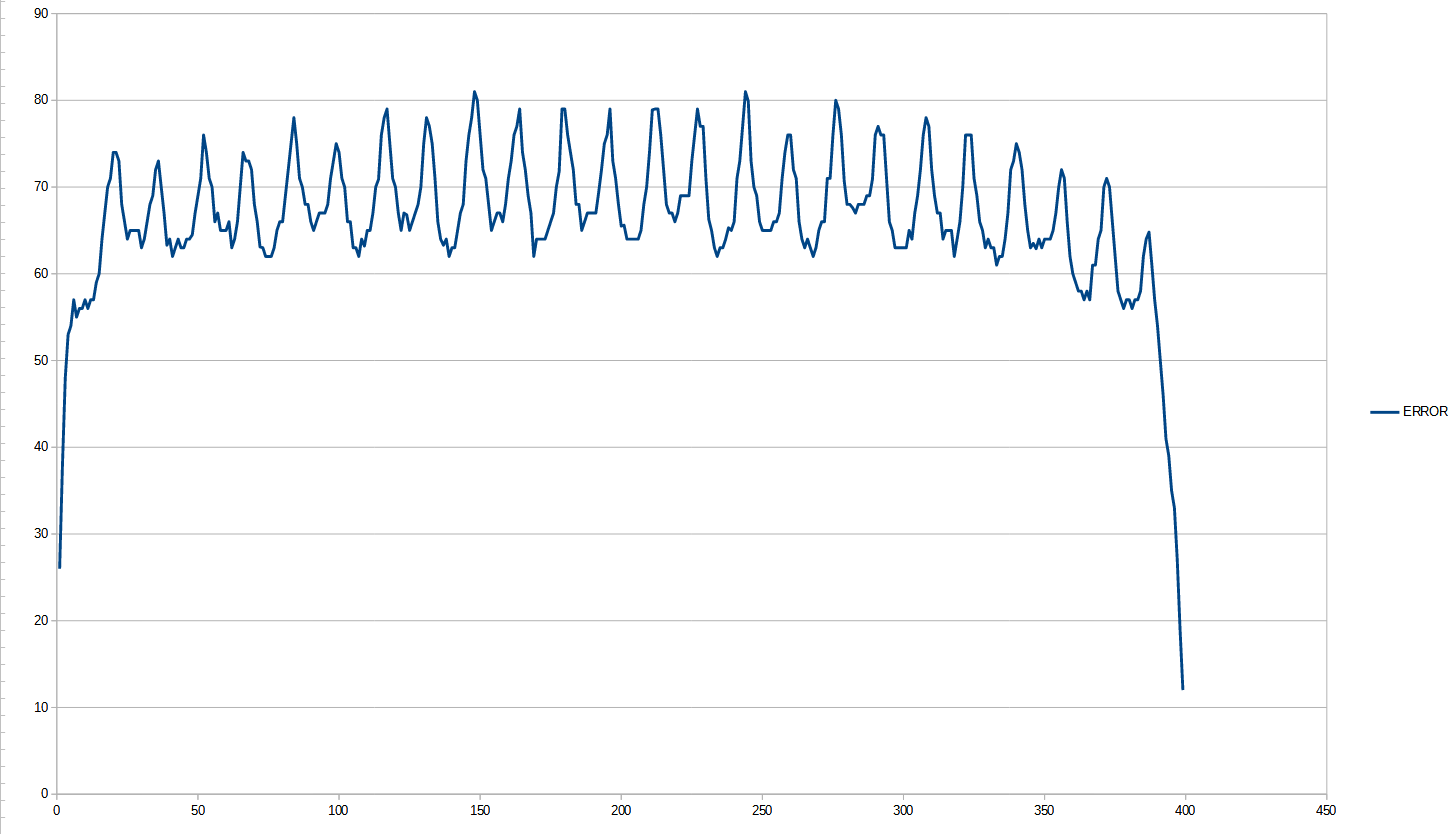
-
It looks like you are taking 3201 samples every revolution when I look at the .zip file you uploaded.
the "multiturn" file is stepping for a while (whole night) going forward. encoder goes up to 65535 and then to 0 (it is absolute encoder) so it allow multiturn but records only positions inside one revolution
the "single turn" have 2 reasons to figure out it's full turn, one is to read the "similar" (20 less difference) position from the first one it reads when it start, and second reason is if it makes 400*32 steps (I assume 1/32 microstepping .9 degree motor ) .. first run it made 3199 steps in second 3200 steps. Motor is 1.8 degree and microstepping is 1/16 so 3200 steps is ok.
Now, you see "more" data, that's cause I do: Step, read encoder 10 times (output all 10), calc average of those 10 and display average value (add them all together and divide by 10). So for every step there is 11 rows in the txt file...
-
error goes from 60 to 80 or 0.33° to 0.44°
the span is 400 microsteps or 25 full steps so I'm assuming the full step positions are where the error is .33° and between steps the error goes up to .44°. I expected to see 50 peaks and not 25 as I expected that "half step" is nearly as precise as full step (as number of ppl and documents online state)
-
I'll use a stiff coupler now to see if that would make a difference...
-
raw data (the xls is few posts back)
-
S42B - same motor, open-loop mode, here we can see, I think the half stepping too...
-
@arhi Can you post your Python code for this?
I suspect there's an "off-by-one" somewhere and you're getting better results than you see in your graph.
I'm probably wrong, but if so, you might be happy.
-
This post is deleted! -
@alankilian said in stepper precision:
@arhi Can you post your Python code for this?
I suspect there's an "off-by-one" somewhere and you're getting better results than you see in your graph.
I'm probably wrong, but if so, you might be happy.
I hoped but it's not
 anyhow .. here it is:
anyhow .. here it is:#!/usr/bin/env python3 import pyprofibus import time import RPi.GPIO as GPIO def main(watchdog=None): master = None forwarddata = [] backwardsdata = [] #poserem se na jezik for i in range(410): forwarddata.append(0); backwardsdata.append(0); try: config = pyprofibus.PbConf.fromFile("arhi_readencoder.conf") master = config.makeDPM() outData = {} for slaveConf in config.slaveConfs: slaveDesc = slaveConf.makeDpSlaveDesc() master.addSlave(slaveDesc) outData[slaveDesc.slaveAddr] = bytearray((0x00, )) master.initialize() GPIO.setmode(GPIO.BCM) GPIO.setup(12, GPIO.OUT) GPIO.setup(13, GPIO.OUT) GPIO.output(12, GPIO.LOW) GPIO.output(13, GPIO.LOW) totalsteps = 0 for i in range(400): done = False counter = 0 average = 0 while not done: outData[slaveDesc.slaveAddr] = bytearray((0x00,0x00,0x00,0x00, )) for slaveDesc in master.getSlaveList(): slaveDesc.setOutData(outData[slaveDesc.slaveAddr]) handledSlaveDesc = master.run() if handledSlaveDesc: inData = handledSlaveDesc.getInData() if inData is not None: print(inData[3] + inData[2]*256) average = average + inData[3] + inData[2]*256 counter = counter + 1 if (counter > 9): done = True average = average / 10 if watchdog is not None: watchdog() print("AVERAGE: ", totalsteps, ", ", average, flush=True) forwarddata[totalsteps] = average; # now do a step GPIO.output(12, GPIO.HIGH) time.sleep(0.0001) GPIO.output(12, GPIO.LOW) time.sleep(1) totalsteps = totalsteps + 1 GPIO.output(13, GPIO.HIGH) for i in range(400): done = False counter = 0 average = 0 while not done: outData[slaveDesc.slaveAddr] = bytearray((0x00,0x00,0x00,0x00, )) for slaveDesc in master.getSlaveList(): slaveDesc.setOutData(outData[slaveDesc.slaveAddr]) handledSlaveDesc = master.run() if handledSlaveDesc: inData = handledSlaveDesc.getInData() if inData is not None: print(inData[3] + inData[2]*256) average = average + inData[3] + inData[2]*256 counter = counter + 1 if (counter > 9): done = True average = average / 10 if watchdog is not None: watchdog() print("AVERAGE: ", totalsteps, ", ", average, flush=True) backwardsdata[totalsteps] = average; # now do a step GPIO.output(12, GPIO.HIGH) time.sleep(0.0001) GPIO.output(12, GPIO.LOW) time.sleep(1) totalsteps = totalsteps - 1 for i in range( len(backwardsdata) ): print(i, forwarddata[i], backwardsdata[i], forwarddata[i] - backwardsdata[i]) except pyprofibus.ProfibusError as e: print("Terminating: %s" % str(e)) return 1 finally: GPIO.cleanup() if master: master.destroy() return 0 if __name__ == "__main__": import sys sys.exit(main())The "off by one" is imho "not a problem" as if you look at the printout ..
0 20828.0 0 20828.0 1 20835.0 20869.0 -34.0 2 20840.0 20876.0 -36.0 ... 398 23964.0 23972.0 -8.0 399 23972.0 23976.0 -4.0 400 0 23979.0 -23979.0you see that firs read is 20828.0, 0 - so going backwards I did not read backwards at all, and last read is 0, 23979.0 so going forward I didn't read that one ...
also you see the "end" going forward it goes up (last dataset, for the TMC driver it's reversed)
23964.0
23972.0then first read backwards (actually it was not stepped backwards yet that's position after last step forward)
23979.0 so larger than 23972and then it goes down again
23976.0
23972.0also, if you look how error is down to nothing when you just turn direction and how it rises... takes some 20+ steps in reverse for error to catch up the average values..
First step back the error is 0.02 degrees
-
I managed to get S42B v1.0 to work (no clue how any more), now it's running in closedloop mode too so waiting for results... interesting - I have no clue what microstepping it is running at, lcd configured 1/32 but what it is actually doing - no clue, will run the original one direction full circle after this back-forth finish
need to find my vallder (leadshine clone) .. dunno where I put the darn thing in this chaos
-
S42B V1.0 - in closed loop mode def does not work ok .. having ton of issues with it, was not working at all, now it moves but .. the worse part is it's not even showing that there is an error here
 .. other ppl also report issues with it so won't waste more time on it
.. other ppl also report issues with it so won't waste more time on it  ..
..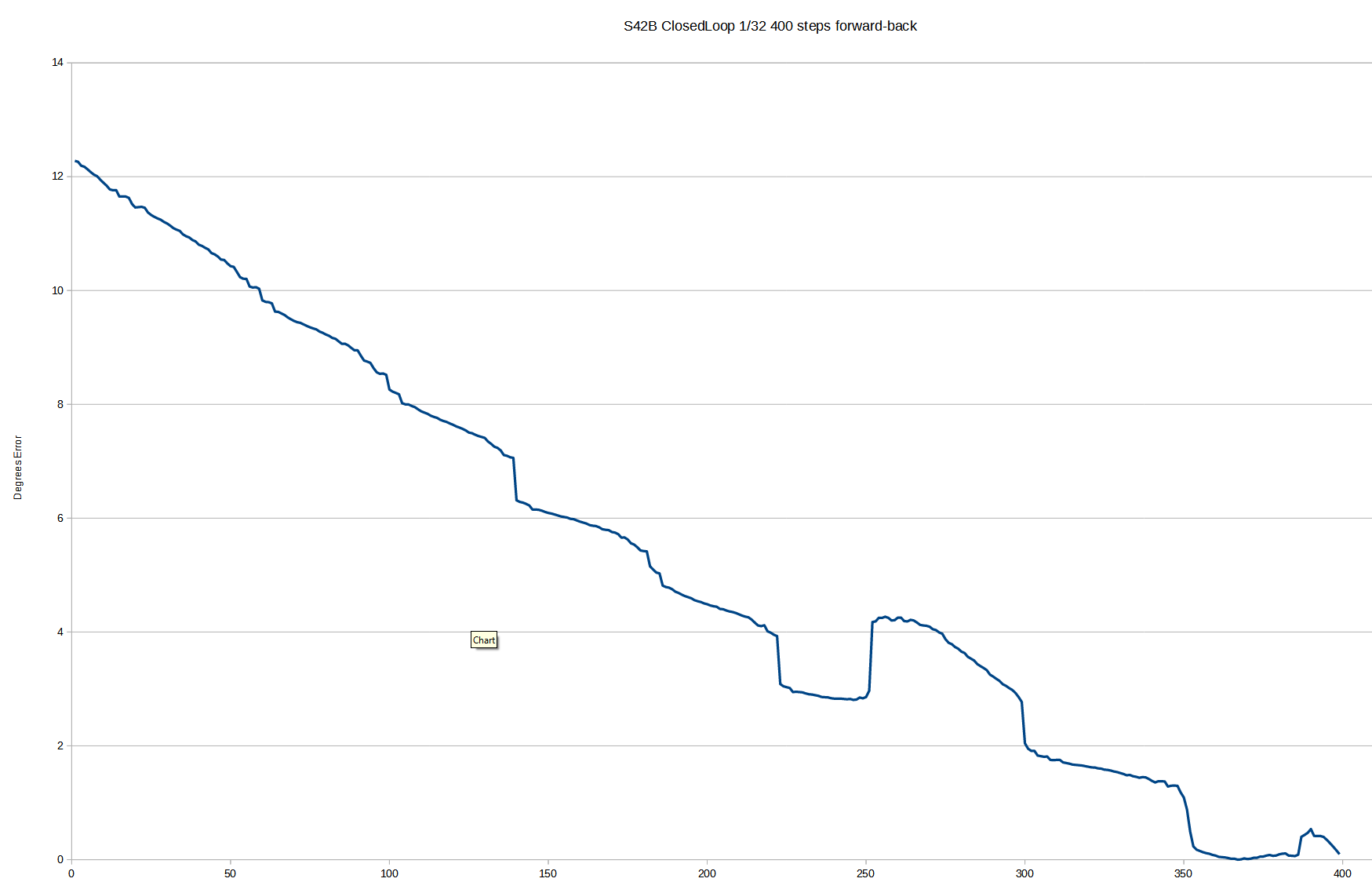
-
@arhi said in stepper precision:
if you look how error is down to nothing when you just turn direction and how it rises... takes some 20+ steps in reverse for error to catch up the average values..
If I'm understanding you correctly, that's probably the flexibility in your tape/ziptie connection causing "backlash"
When I move datapoints around to fake-eliminate that backlash (if that's what it is) I get a very nice chart of error values.
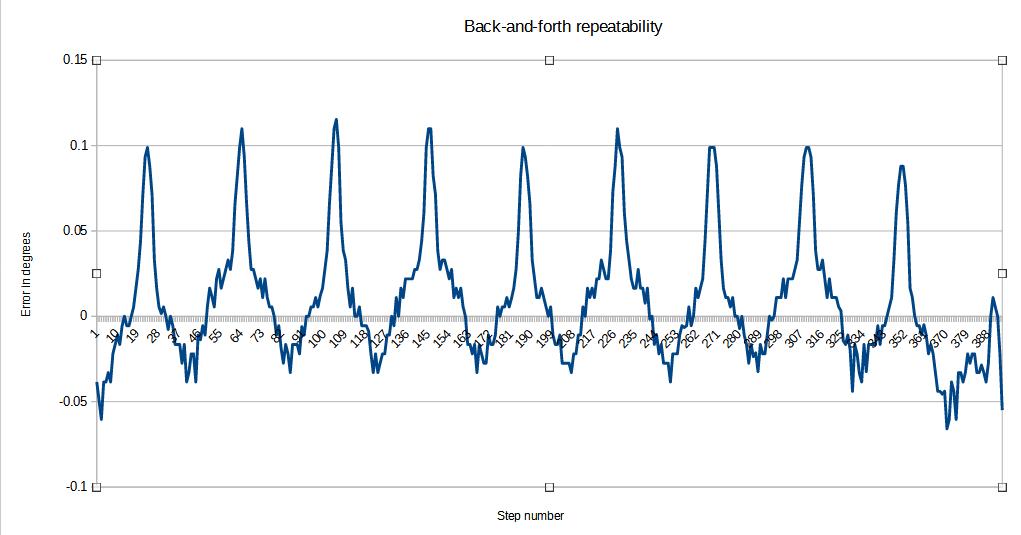
-
@alankilian said in stepper precision:
If I'm understanding you correctly, that's probably the flexibility in your tape/ziptie connection causing "backlash"
very possible. I tested 10 steps back/forth and was getting values 0-2 for error so assumed that's it but looks like it's not holding water... darn encoder have shaft larger than nema17 and smaller than 8mm so none of my couplers fit.. ordered some new but..
-
S42B, closed loop mode - changed menu to 1/16 (from 1/32) and let it calibrate again
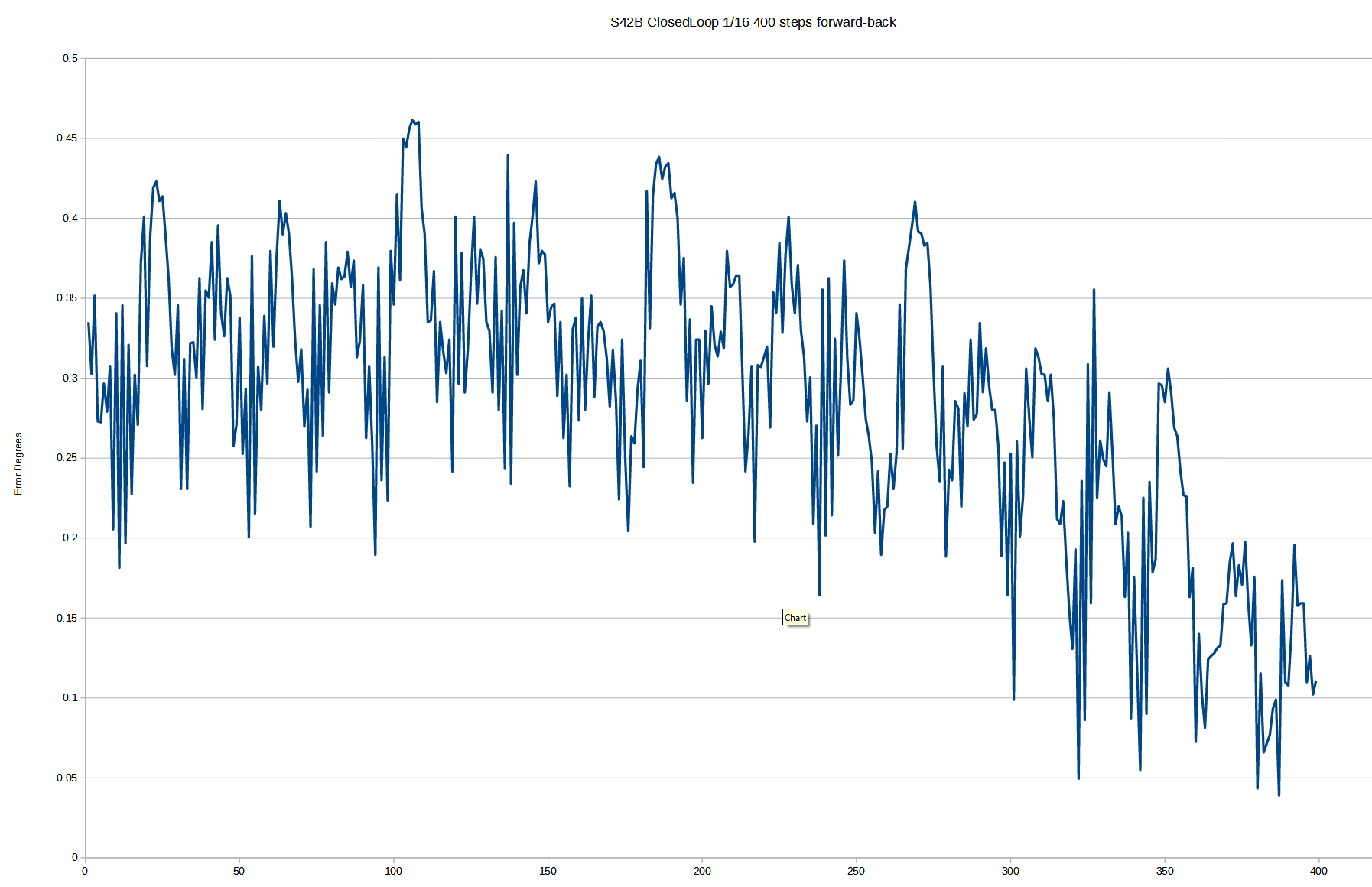
-
enough for now, need to stiffen this coupling
-
If you have it available somewhere you can use some 6mm/8mm inner diameter petrol hose. The rubber kind with a (cotton?) braid as reinforcement embedded in the rubber. Due to the reinforcement that stuff is quite stiff in rotation, due to it being rubber a hose clamp clamps it stiffly around a shaft.
I stumbled over M569.1 in the G-code reference today. Is that already implemented?
In case you have to return the encoder before finishing you tests: I probably have some 2500-line incremental encoders with quadrature output (10000 pulses/rev) lying around over here somewhere. I can miss one or two. If I can find them..
(you may think your mancave is a mess, but I am fairly certain I win that battle) -
@DaBit said in stepper precision:
If you have it available somewhere you can use some 6mm/8mm inner diameter petrol hose. The rubber kind with a (cotton?) braid as reinforcement embedded in the rubber. Due to the reinforcement that stuff is quite stiff in rotation, due to it being rubber a hose clamp clamps it stiffly around a shaft.
no way to get it as most shops are closed but I expect monday to arrive the aluminium 5-5 that I'll drill on one side to 6mm should work ok I'll try to put it in a lathe
I stumbled over M569.1 in the G-code reference today. Is that already implemented?
no idea
In case you have to return the encoder before finishing you tests: I probably have some 2500-line incremental encoders with quadrature output (10000 pulses/rev) lying around over here somewhere. I can miss one or two. If I can find them..
Thanks :), the idea with 16bit was to get really precise data about microstepping, I think I'll manage to get all the testing I want before I return it
(you may think your mancave is a mess, but I am fairly certain I win that battle)
uh, I doubt, not 'cause my mancave is normally total chaos but because I purchased a house in 2019 and started renovating and it features a small 50m2 guest house (with 50m2 under roof storage too) in the yard that I planned to use as my new mancave, and since the plan was to move in summer 2020 I started converting my current mancave (a 20m2 room 5m high in appartment) into storage room, so I'm now working from something one could call storage and not mancave, stuff falls on me non stop, if I move too fast stuff falls of my desk, keyboard drawer etc .. very nasty place to work, not at all "artistic chaos", more like "garbage dump"
 ... and due to #$%^#^% we did not move yet so .. house is still being renovated and I work berried in "garbage"
... and due to #$%^#^% we did not move yet so .. house is still being renovated and I work berried in "garbage"  .. not something I am happy with
.. not something I am happy with 
-
alu coupling mounted.. repeating the measurements..
